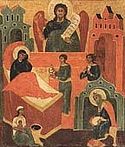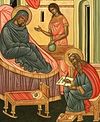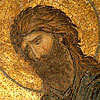

| Previous day | Next day |
| Old Style
January 7
|
Sunday |
New Style
January 20
|
| 34th Sunday after Pentecost. Tone 1. | No fast.
|
![]() Afterfeast of the Theophany.
Afterfeast of the Theophany. ![]() Synaxis of the Holy Glorious Prophet, Forerunner, and Baptist John.
Synaxis of the Holy Glorious Prophet, Forerunner, and Baptist John.
New Hieromartyrs Paphnutius (Kostin), hieromonk of Optina Monastery (1938) and Nicholas (Parfenov), bishop of Atkarsk (1939).
St. Brannock (Brynach) of Braunton, England (6th c.). St. Cedd, bishop of Lastingham (664). New Martyr Athanasius of Attalia and Smyrna (1700).
Thoughts for Each Day of the Year
According to the Daily Church Readings from the Word of God
By St. Theophan the Recluse

Thursday (Synaxis of the Forerunner). [Acts 19:1–8; John 1:29–34]
Saint John bore witness of Christ Jesus, that He is in truth the Lamb of God, Which taketh away the sin of the world (John 1:29), that He is the promised Deliverer, awaited by all. Those who were near him heard this and believed. From them this witness passed on to the people, and everyone began to think that he of whom John bore witness was not an ordinary man. The Saviour pointed this out when in the last days in the temple, he proposed to the heads of the temple a question: whence was the baptism of John, from heaven or of men (cf. Mark 11:29)? They refrained from answering, because it was impossible for them not to see that John came baptizing with water not of himself. But if they were to say this, they would immediately have to acknowledge John’s testimony that the Promised One was before them, and therefore be compelled to submit to His teaching. But they did not want to submit, not for any well-founded reasons, but solely because of their prejudice. But their obstinacy does not in the least lessen the power of the witness of St. John. To this day, it is as certain as it was when it came forth from his mouth. We hearken unto John who shows us the true Deliverer; and through this we enliven our faith, as a faith which has tangible proof behind it.
Sunday after Theophany (32nd). [Eph. 4:7–13; Matt. 4:12–17]
Yesterday the Apostle armed the Christian who sets out upon the path of salvation with the whole spiritual armour. Now he shows who the leaders are in this battle procession, and what is the final bright goal of all for our inspiration in times of hardship. The leaders are pastors and teachers, whom the Lord gave to the Church and through whose mouth He Himself utters guiding direction needful for all, as soon as one turns to such leaders with faith and prayerful appeal to the Lord. Those who selflessly walk the Lord’s path know this truth, as do those who lead a struggle with the enemies of salvation without pity for themselves. In their pastors they always find help and are brought to understanding, when, looking from the outside, such help could not be anticipated. For they do not come to men, but to the Lord, who is always prepared to direct and give understanding through such men, to anyone who sincerely and with faith seeks help from Him. The final bright goal is the measure of the stature of the fullness of Christ—the stature of a perfect man (Eph. 4:13). We all know what a perfect man is in the usual order of things, and we could hardly find a person who would not wish to attain such perfection. But the meaning of a perfect man in the Lord is something not known to anyone other than those who have entered into that stature. This, however, should not cool one’s fervour for the attainment of such a stature, but on the contrary should kindle it even more; for this lack of knowledge is due to the height of that spiritual perfection which is called a manly stature in a life according to God. The Apostle defined this as the taking on of the fullness of perfections revealed in the Lord and Saviour. Anyone can see that there is reason for us to apply all diligence (II Pet. 1:5) toward our calling.
Articles
 Nativity of the Holy Glorious Prophet, Forerunner and Baptist, John |
 St. Brannock of BrauntonSaint Brannock lived in the sixth century, and tutored the children of the Welsh ruler Brychan. |
 St. Cedd of LastinghamSaint Cedd was a missionary and bishop who spread the faith throughout England during the seventh century. |












